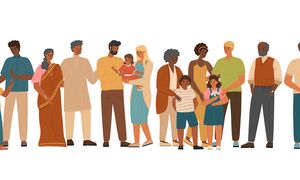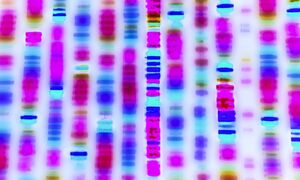
Transform the future of healthcare
Genomic medicine is already helping more people receive answers about their health conditions through better diagnosis, treatment, and support. By volunteering to take part in research, you'll be making a difference to NHS patients and the future of genomic medicine.

How it works
As part of your clinical care with the NHS Genomic Medicine Service, you may be offered whole genome sequencing. Your clinician may also ask you whether you would like to add your genome sequence and health data to the National Genomic Research Library (NGRL). This is helping patients across the NHS get more answers to their health questions through research.
It's your choice. If you consent, your data is de-identified and added to the NGRL – our secure, national database of genomic and health data.
Approved researchers and clinicians can then compare your de-identified samples and data with thousands of other people. The more people that take part, the more likely you are to get an accurate diagnosis.

The consent journey
-
1You and your clinician may decide together that whole genome sequencing might be helpful as part of your care
-
2DNA is extracted from a blood sample you give, and then sequenced
-
3Your genome (DNA) data is stored and analysed
-
4Your clinical team will get the results and discuss them with you
-
5If you consent to further research, your information will be de-identified and aggregated with thousands of other participants' data
-
6Researchers will study the data to gain biological insights, and develop diagnostics and treatments to improve NHS patients' lives
It's your choice
It’s up to you whether or not you want to contribute your data to the National Genomic Research Library. If you say ‘no’, you will still get your genomic test and it will not change or affect the care you receive from the NHS.
Possible benefits of consenting to include your data in the National Genomic Research Library
Get answers
For you or others now or in the future that could lead to a diagnosis, access to a different treatment, or an opportunity to participate in clinical trials
Help others with similar conditions
Insights from your data may be able to provide answers for people with a similar condition and even those with many other sorts of conditions
Be part of transforming healthcare
By participating, you'll be part of a new national approach working with the NHS to bring together health data and genomic data for better patient care
The impact of genomic research – Jessica's story
When Jessica was just 4 years old, she was diagnosed with a rare condition. After receiving her sample, and after filtering the results against our curated knowledge base, we were able to find the one causal variant out of the 6.4 million we originally found. A diagnosis made it possible to recommend a special, personalised treatment that helps reduce Jessica's symptoms.
Focus areas and projects
Cancer 2.0
Our initiative to integrate long-read sequencing technology and multimodal…
Diverse Data
Working in collaboration with researchers and the NHS, our Diverse Data…
COVID-19 Study
Read about our partnership with the GenOMICC consortium, led by the…
100,000 Genomes Project
Information on the 100,000 Genomes Project, including an overview of the…
Important information


Support and resources
How genomic data is gathered via the NHS Genomic Medicine Service and used in the National Genomic Research Library. FAQs on taking part
Additional findings
Participants in the 100,000 Genomes Project were asked if they wanted us to look for additional health information in their genome sequence; we call these 'additional findings'. Additional findings